#author:Rebecca
Explore tagged Tumblr posts
Text
Episode 29: One Narrow Thread
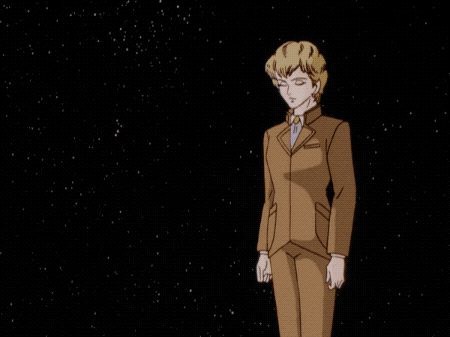
Early 798/489. Adrian Rubinsky meets with Bishop Degsby of the Earth Cult to discuss his plans to aid Reinhard’s forces in capturing Iserlohn and then assassinate Reinhard to seize power for Phezzan. Degsby points out that under this scheme the Earth Cult’s investment in setting up a puppet government on Heinessen would be a wasted resource, but Rubinsky plans to use his financial control over the Alliance government to manipulate them into backing Yang into a corner. Degsby reminds Rubinsky that he owes the Grand Archbishop for his current position and had better tread carefully. Rubinsky sends his minion Kesserling to Remschild to propose a scheme that will ensure that the Empire and Alliance continue to fight each other, while Admiral Kempf attempts to perfectly sync twelve warp engines to avoid trapping all of Geiersberg fortress in null space. ….....Meanwhile back in the actual show we’ve been watching, Yang loses at 3D chess, Julian attempts to drink wine, and Hilda visits Kircheis’s grave.
A Quick Language Rant
“Words are like icebergs floating on the ocean called ‘heart.’” This quote provides the guiding philosophy for this project: LoGH is a text that uses the nuances of language, in concert with facial expressions, body language, symbolism, etc., to point the viewer to deeper layers of meaning in the story being told. As a close reading of the queer narratives in LoGH, this blog attempts to tease out and expose these slightly hidden layers. But…..we are writing in English. You’re reading this in English. The gifs we reference have English subtitles and no sound. And uhh, how do I put this diplomatically…
Every English translation of LoGH sucks.
...Okay that’s a bit harsh. Translation is fucking hard, especially of such a complicated work, and everyone who’s put hours and hours and hours into bringing LoGH to the English-speaking world deserves a hell of a lot of gratitude and credit. We never would have been able to watch the show without them. But. When we get into the nitty-gritty details of analyzing a scene, the fact that often none of the existing translations matches the nuance of the Japanese gets in the way. I’d much rather be plunging into yelling at Cazellnu right now than writing this note, but the conversation between Cazellnu and Yang in this episode is a mess in both sets of subtitles that I have access to, so here we are.

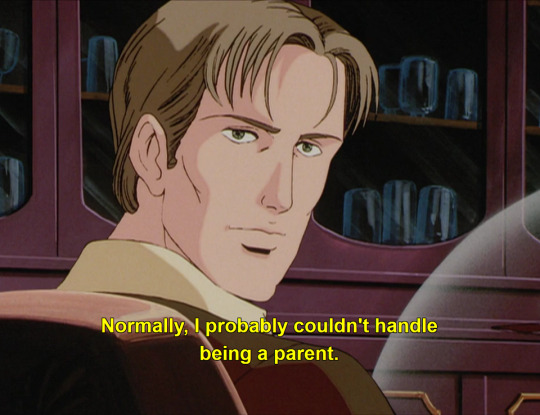
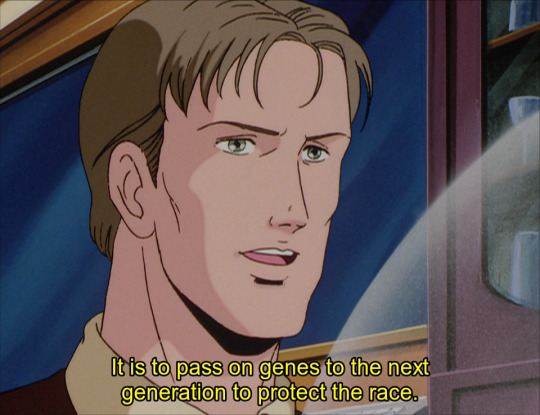

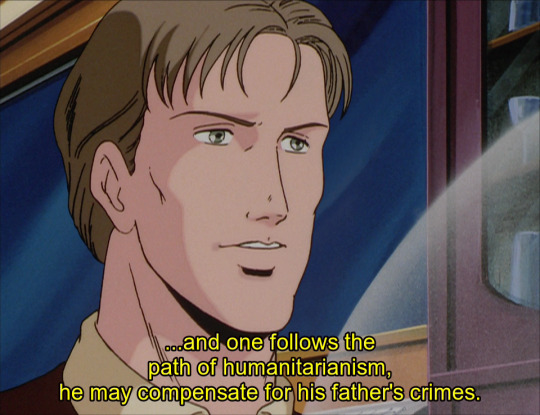
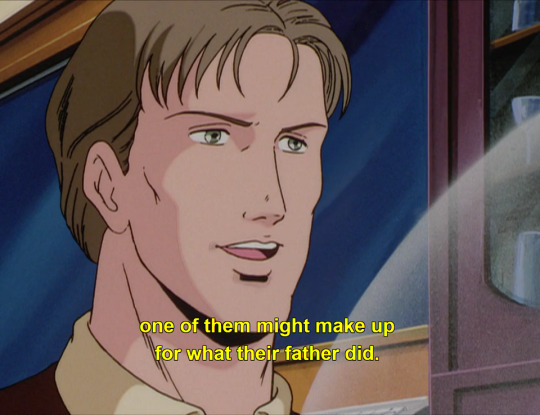


Let’s start with the fansubs, on the left—notice a couple whole clauses that aren’t in the official Hidive subs at all? Care to guess where they come from? That’s right, they come directly from the novels, as does the word “perfect” in Yang’s “perfect parent” line. Hey, I totally get it, fansubbers, the novels are a fantastic resource for figuring out the kanji or double-checking words that are hard to hear. But the dialogue in the anime is not in fact lifted verbatim from the novels; and while not every difference is super meaningful, we are interested in the intentional choices made by the anime staff, and that makes deviation from the books especially ripe for analysis.
The official subs, which are generally quite reliable, are also unsatisfying in this scene. As I’ll discuss below, the word that Yang uses replacing the novel’s “perfect” is 人並みに, hitonami ni, an adverb meaning “like others/as much as anyone else.” The official sub translation makes it sound more like “under normal circumstances” than “like normal people,” and while that’s not a life-altering difference, the nuance is relevant to my analysis. And they got the grammar of the sentence in the last gif here backwards; indeed, neither subtitle translation understood what I believe Yang is saying in those lines, but the English translation of the novel agrees with my interpretation. (Not that the novels don’t have their own translation problems, which is outside the scope of this blog but also frustrating…)
Phew. What all of this means is that before we can even start writing a post, we have to go through a whole process of triangulating all of the slightly different translations of any scene we want to analyze in detail, making sure that we understand the nuances of the language and can convey them accurately. (Not to mention checking the original LD version to make sure no significant changes were made to the animation in the DVD remaster!) In the case of the conversation between Yang and Cazellnu, the subtitles used in this post are my own synthesis based on the fansubs (modified to reflect the actual anime dialogue) and the translation in the novel (where I believe it to be more accurate).
With that out of the way, we are now ready to plunge into the main battle of this episode, so buckle up for....
Yang vs. Cazellnu!
That’s right, we’ve seen Yang battle Imperial fleets to improbable stalemates at Astate and Amlitzer, outsmart the commanders of Iserlohn to capture it from the inside, and annihilate one of his own nation’s fleets on his way to defeating the military coup; but how does Yang the Magician handle the most intimidating of all battles: having dinner with a married friend?? I’ve said before that Icebergs is not a relationship advice column, and nor is it, usually, a tips and tricks guide for dealing with pressure from peers to conform to heteronormative expectations, but hey—when we have the chance to learn from a Master Tactician, we should take it, right?

...Hmm.
...Well in any case, what’s fascinating and important about this conversation is that it does have the back-and-forth tension of a battle, with multiple strikes and counterstrikes: Yang employs a wide range of different strategies tactics to parry the various arguments that Cazellnu makes in his quest to convince Yang of his duty to marry. This conversation is key to understanding both Yang’s attitude toward marriage and family, and the way that Cazellnu often speaks explicitly in the voice of the normative pressures society puts on people to fit into the “married with kids” box. The dynamics of the entire interaction set Yang and Cazellnu up as opponents, and the sum total of Yang’s resistance to all of Cazellnu’s different angles of attack paints a clear picture of his current reluctance to see himself in the role of husband or father.
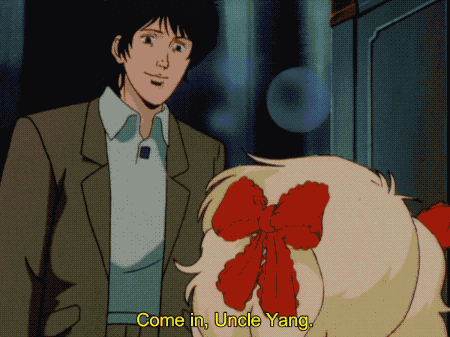
Yang does indeed provide the first opening to be scolded about marriage, when he takes offense at Charlotte using the suffix -ojichama (an affectionate “uncle”) in contrast to -oniichama, “big brother,” for Julian. Keep this moment in mind; I’ll be coming back to it in…*checks calendar* about eight months.

Immediately Cazellnu frames marriage as a societal obligation, and failure to marry as a “luxury.” Aww Cazellnu you romantic you.
In the previous episode we saw Mittermeyer pushed toward a normative marriage by subtle, insidious pressures—his upbringing within the context of a traditional family and the (possibly unspoken) expectations from his parents that he’d follow that model; the preponderance of visible heterosexual romance in his society. We’ve seen Yang swept along passively into romantic situations in which he was obviously uncomfortable. But Cazellnu’s line right here is the first time that a character has actually given voice to the institutional heteronormativity of society, actually advocated for it in so many words, actually leveraged it to criticize someone’s deviation from that norm.
Bantering with a friend in the abstract is way less uncomfortable for Yang than being thrust directly into a potentially romantic/sexual situation—unlike when Lapp pushed him to dance with Jessica or when Jessica threw herself at him, here there is no immediate danger, no specific person to reject or offend. This is an intellectual battlefield. And so Yang does fight back actively, starting with Tactic #1: appeal to historical precedent.

Note that while in his initial grumbling Yang said he wanted to be called oniichama while *still* a bachelor, now that he’s talking in the abstract rather than about himself he’s taking the even stronger stance that people can be productive members of society while *never* getting married. This line of argument makes sense; history is where Yang feels like an authority, and even the syntax of his “shall I make you a list?” reinforces his expertise here.
If Cazellnu’s thesis were that marrying is the only way to be an asset to society, Yang pointing out the existence of plenty of queer people—er sorry, “lifelong bachelors”—making contributions throughout history would be an effective rebuttal. (No, I don’t think that Yang is consciously talking about queerness, but yes I do think the creators are, through him.) But Cazellnu’s thesis is that participating in marriage and reproduction is an obligation on top of whatever other accomplishments someone might have, and Yang bringing up historical precedent opens the door to Cazellnu pointing out that not only is marriage the norm right now, but it has been for much of history.

In case you think I’m just being overly cute with all the battle analogies, it comes directly from the source material: The narration in the novel here contains lines like “And the point goes to Cazellnu, Julian thought” and “Yang didn’t attempt another counterstrike.”
In the anime, however, Yang does attempt one more counterstrike here, which is important because it’s the closest he gets to just saying “but I don’t want to.”
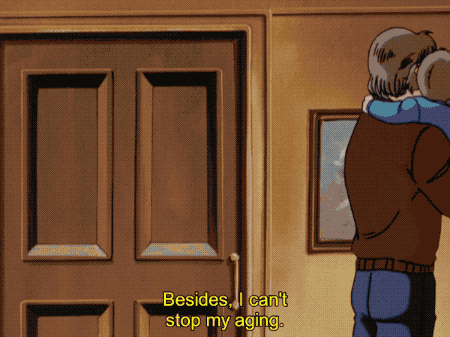
For Tactic #2, Yang complains that he didn’t pass thirty on purpose; in other words, Cazellnu may think he’s at an age where he ought to be married, but on the inside he doesn’t feel ready for that role. In case there was any suspense about Julian’s feelings on the matter, he is in no rush for Yang to decide he has to get married—keep this line in mind too, as I’ll be coming back to it in a mere six months.
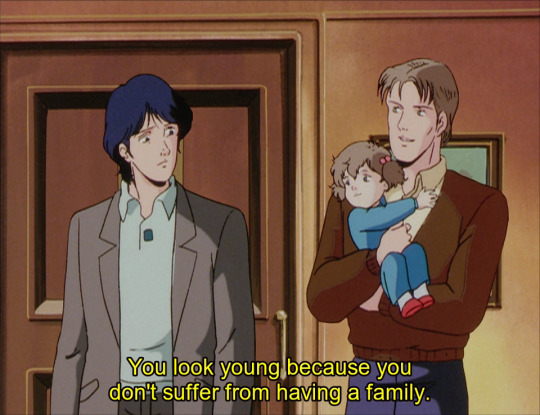
Cazellnu switches the issue from Yang’s feelings to his outward appearance—a subtle but symbolic shift. If only Yang would suck it up and play the proper role, he would become (outwardly at least) a true adult. The issue of Yang’s desires is casually brushed aside.
This entire exchange is good-natured banter—Cazellnu’s intention here, at least on the surface, is to tease Yang, not to seriously condemn him for his choices. But the framework in which people joke is telling; and Cazellnu’s teasing is framed around the assertion that Yang is selfish for neglecting his duty to play the part of husband. Stage one of the battle is interrupted at this point for dinner, and for stage two, during a 3D chess match after dinner, Cazellnu’s joking tone is gone. The topic at issue this time is not just marriage but also parenting; when Cazellnu casually (but correctly) criticizes Yang’s parenting skills, Yang defends himself with Tactic #3: appeal to special circumstances.

Notice that Julian is paralleled to Hortence here in the role of caretaker to the girls. He’s simultaneously being included by implication in the younger generation—as Cazellnu and Yang discuss Yang’s pseudo-parental role in his life—and acting as an adult vis-à-vis the younger kids. At the risk of becoming a broken record...keep this moment in mind, as I’ll be coming back to it in the future.
The key to what Yang’s trying to say here is that adverb I mentioned earlier, hitonami ni, which is a deviation from the dialogue in the novel and therefore something the anime staff thought about explicitly. Hitonami is an adjective meaning average or ordinary (literally “in line with people”), so the adverb form means “like other/most people.” Yang is situating himself as fundamentally outside of the norms that Cazellnu is so fond of imposing: He couldn’t be expected to be a parent like normal people, because he didn’t grow up with a model of a traditional family and because he’s single.
His upbringing is in the past and outside his control; but being single is (on the surface) a choice that he has made—between the tables full of love letters, and Jessica being none too subtle about her continued interest, and everyone on all of Iserlohn knowing that Frederica has a thing for him, it’s always been clear that he’d have options if he were interested. It’s not that his point here doesn’t stand—I agree, the fact that he’s a bachelor who lives alone and has zero interest in or experience with kids did make him a strange choice for Julian’s guardian. But tactically, within this conversation, this was a huge blunder: It opens the door right back up for Cazellnu to continue the marriage guilt trip that was interrupted earlier. And sure enough...
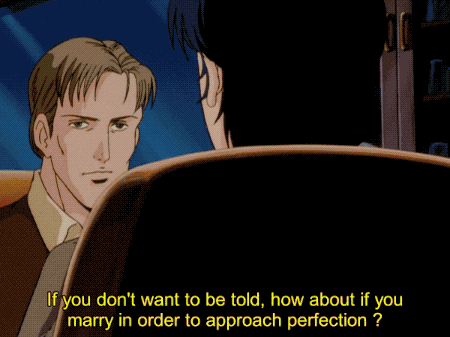
This is such an obvious error that it seems revealing; in Yang’s subconscious, when he’s thinking about why he can’t be expected to be a parent “like most people,” his status as single might feel like something more innate about himself than a temporary circumstance or choice. His shock here is overdone considering the earlier banter. Tactic #4, blaming the ongoing war, is presumably one he’s used before, as Cazellnu is expecting it and doesn’t bother engaging with it directly at all, instead…
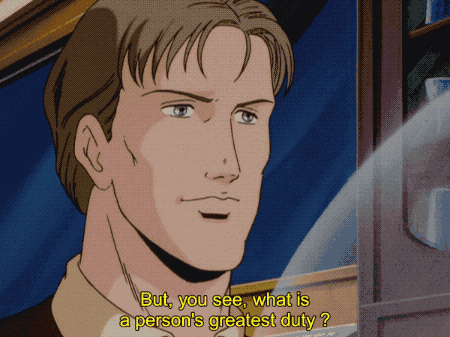
...finally delivering his thesis statement on marriage and reproduction clearly. And well, it’s a doozy.
A human being’s greatest duty is to bring forth new life. Damn Cazellnu. The use of the word “duty” (Japanese: 義務, gimu) echoes what Poplan started to say to Konev and Julian about a man’s “duty” to have sex with women; within the first three episodes of the season we’ve had two different characters explicitly describe heterosexual sex and/or reproduction as an obligation. (And throw in the slightly more coded discussion of Mittermeyer’s parents’ “expectations” about his role in society that preface the depiction of his marriage, as well as Reuental’s discussion of his own parents’ unhealthy and unromantic marriage that we haven’t even had time to talk about yet…..hmmmm is it possible that a theme is being established here?)
I can’t emphasize the importance of these lines enough: This is not passive, silent, subtle heteronormativity. This is Cazellnu voicing a view of the main purpose of human life that positions essentially all queerness as not just unusual or different, but specifically a deviation from the greatest duty of human beings. He is not joking. He’s not bantering. This is his worldview.
...And it pisses Yang off. Leaning forward in his seat, setting his brandy glass down with a noticeable thud, furrowing his eyebrows—this is more visibly angry body language than we usually see from Yang. As for the actual content of Tactic #5, well, as much as I love Yang I have to accuse him of a bit of an obnoxious-Reddit-poster argument style here, completely avoiding what Cazellnu actually said and deflecting the topic to something he’d rather be arguing about instead.
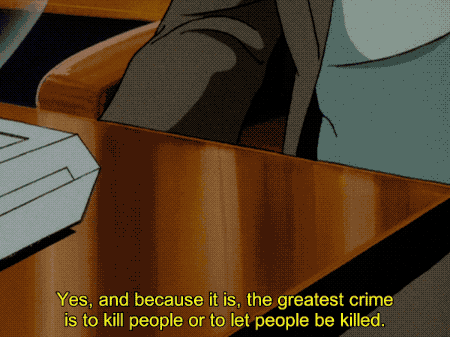
Yang: “Yo can we please go back to talking about how much war sucks? I thought I signed up to be on an anti-war show, not to be lectured at about heteronormative social structures…”
The best I can do to relate this reply to what Cazellnu said is that Yang’s either implying that his own record of causing death as a commander morally disqualifies him from being worthy of participating in the whole creation of new life thing, or possibly questioning the wisdom of bringing new life into the middle of a war. Cazellnu seems to take it to be about Yang’s sins, as he counters with—somehow—an even more obnoxious view of the point of reproduction.
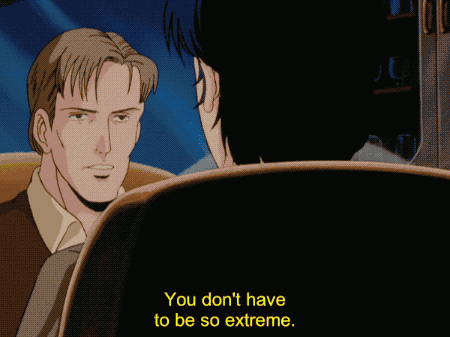
“Okay little Timmy, I’ve caused the deaths of approximately three million soldiers in war, so just be a good boy and go do enough good to compensate for that so Daddy doesn’t go to hell, okay?”
Yang is done with this crap by now, and the next gif is a tactical three-for-one: First he points out that for this specific point of Cazellnu’s, about passing along one’s unfinished ambitions to the next generation, there’s no need for one’s protégés to be biological children (#6); then without giving Cazellnu time to respond (perhaps by pointing out that this doesn’t address his original argument about biological imperative to create life), he adds that this whole discussion is moot in the case that there isn’t unfinished ambition to pass along in the first place—again positioning himself as outside the scope of Cazellnu’s arguments (#7); and finally…

...the ultimate maneuver to win any difficult argument: Tactic #8: get up to go pee.
If you’re keeping score, I’d say that the great undefeated Admiral Yang loses this battle badly. Cazellnu is constantly a step ahead, turning Yang’s arguments back around on him and taking advantage of every opening. Yang is a scholar and a brilliant logical thinker, but you can’t fight convictions like “humans have a duty to reproduce” or “being a bachelor is anti-social behavior” with the kind of logic that Yang is practiced in. Heteronormativity is, for Yang, a more difficult opponent than the Imperial army.
Julian
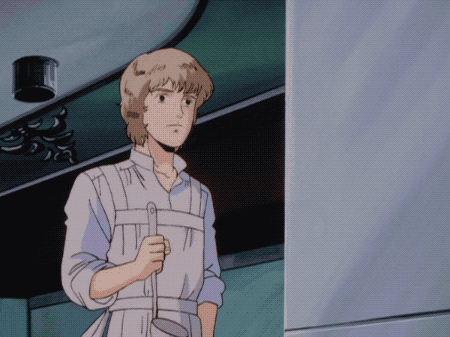
hey-did-we-mention-Julian-has-dual-identities-of-soldier-and-caretaker.gif
The first episode of season two was all about Julian beginning to grow up as a soldier; this episode forms the natural complement by focusing on Julian’s more domestic roles. Back when Julian was first introduced I mentioned that he’s one of the only male characters who embraces more traditionally feminine roles, and in this episode that side of his personality is emphasized—from happily puttering around the kitchen doing laundry and cooking dinner, to helping look after Charlotte and her little sister (henceforth known as Demon Child Cazellnu, D.C. for short, until someone gives me a better explanation for her namelessness…).

Did I say Yang vs. Cazellnu is the main battle of this episode? I should have said it’s second after the epic clash of Gensui vs. the Roomba.
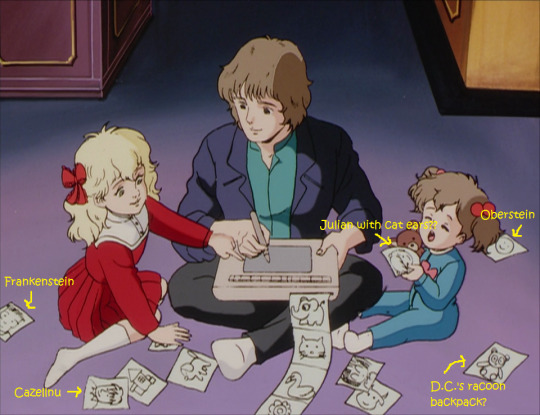
Fun fact: 1600 years in the future everyone has finally gotten over being pedantic about calling it “Frankenstein’s monster”!

It’s not played up in the anime except in background shots like this, but from Julian’s diary it’s clear that, along with Yang, Schenkopp, Poplan, etc., Hortence also serves as a role model and mentor for Julian—he speaks admirably of her ability to quickly turn her new Iserlohn quarters into a true home, and eagerly seeks out new cooking ideas and tips from her.
Julian is by nature a caretaker and nurturer; it’s as much a part of his identity as his urge to fight to protect the things he cares about. I can’t express how fucking cool it is that one of the main protagonists of this show is a teenaged boy who’s completely comfortable putting on an apron and making stew while the washing machine whirs in the background, who looks up to both soldiers and housewives, who spends the evening playing with two little girls until they fall asleep on his lap. The landscape of fiction is generally not filled with men who are defined by empathy and nurturing. It’s so badass and so important that Julian embraces these sides of himself, without feeling the need to somehow reject or outgrow them in order to become a Real Man.™
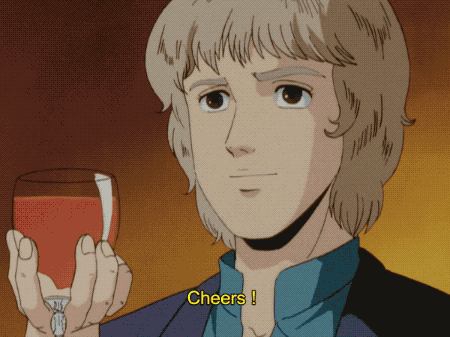
.....Okay Julian yes you are a badass but please dear god learn how to hold a wine glass.
...and Yang

Icebergs Canon: The reason Julian’s suit and Yang’s pajamas are the exact same color is not the animators being lazy, it’s that both items were gifts from Hortence, who clearly bought them at the same store.
Oooh what is this? Actual backstory about what the fuck Julian is even doing in Yang’s life? One keyword of the storytelling style of LoGH is “patience,” and the show has taken its sweet time offering any real explanation of their whole deal. From episode 3 we know that Yang is Julian’s “guardian,” that Julian’s father was also a soldier, and that the military has paid for Julian’s schooling, but in typical LoGH fashion we’re forced to try to piece the details together ourselves. Here, finally, we’re given a few more snippets: Julian was sent to live with Yang four years ago, when he was twelve, and the person who had the brilliant idea to entrust Yang with a child was none other than…
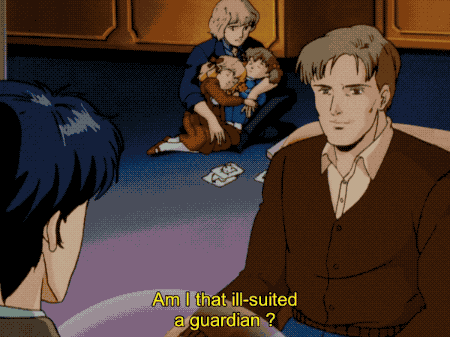
This is the one skirmish of their battle in which Yang is clearly victorious. Even Cazellnu can’t come up with a defense of this decision. Seriously, Cazellnu…..why.

Poor baffled Yang has absolutely no clue what to do with this small human who showed up at his house and immediately started cleaning up. I love that Yang appears to have repeatedly gotten frustrated while writing something and strewn crumpled drafts all over the room...wtf Yang.
This flashback, which takes place earlier in the episode, complements and reinforces Yang and Cazellnu’s discussion of Yang’s total lack of parental instincts: Although he’s come to care about Julian a lot, he had no enthusiasm for this arrangement when Cazellnu first foisted it upon him. He’s Julian’s guardian not because he wanted a child, but because Cazellnu, tasked with managing supplies of all kinds, had a surplus of war orphans needing housing and pressured his friend into taking one in.
Back in the present, Julian continues to stress about Yang’s disapproval of his military career, leading to my third-favorite failure of the Yang-Bechdel Test:
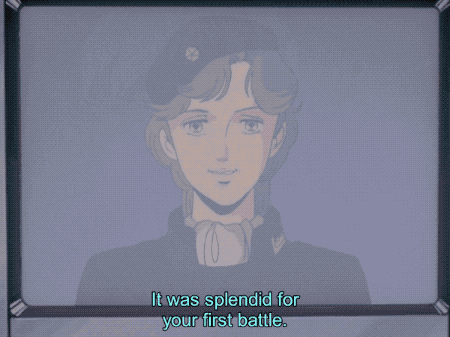
Julian’s main reaction to his promotion is to wonder how Yang will react; his pout shows that, doing a bit of Icebergs-style analysis himself, he reads between the lines of Frederica’s words to understand that Yang did not act pleased.
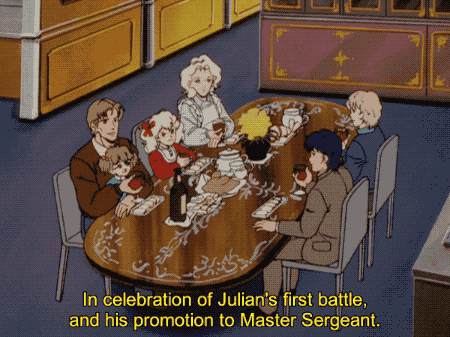
This tension is underscored again when Yang, rather than toasting to Julian’s promotion, toasts his safe return. Geez Yang, kinda passive aggressive.
This episode is all set-up, laying out clearly the main themes of Julian’s arc that will continue to develop through the season: 1) He’s awkwardly between child and adult—offered wine but unable to drink it smoothly; playing together with the girls but in a caretaker role; promoted for his heroics in battle but insecure about Yang’s reaction. And 2) his dynamic with Yang is evolving, with question marks about how exactly they’ll relate as he grows up and about how Yang will deal with the reality of his becoming a soldier.
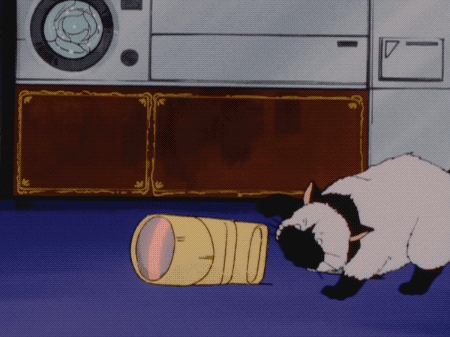
And of course, we’ll be keeping an eye on Gensui’s evolving dynamic with the Roomba as well.
Stray Tidbits
This breathtaking scene in which Hilda visits Kircheis’s grave is one of the first key signs of how seriously the show takes Reinhard’s grief and the hole that Kircheis left in his life going forward. Naturally we’ll be coming back to this moment in the future, so for now I’ll just say, god damn, I have chills.

Worldbuilding alert! Yang’s fleet may be currently stationed on Iserlohn, but lest we forget that it was originally constructed by the Empire, the incredibly fancy paneling of the living quarters is here to remind us. The animators really live and breathe this world and it shows in these details.
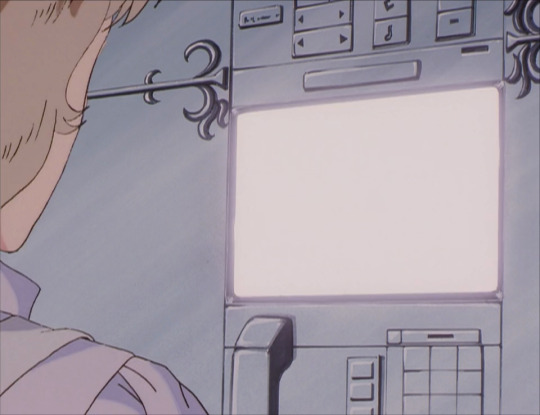
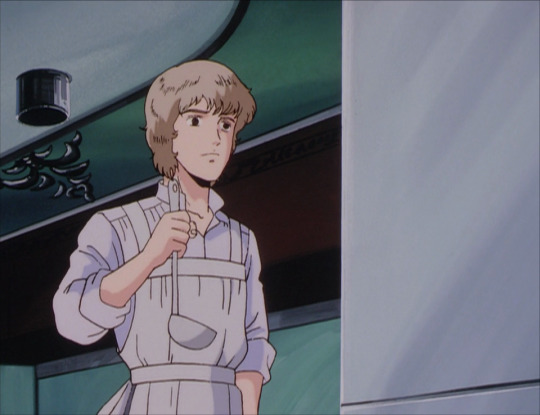
I’d be off-brand if I didn’t comment on Hortence Cazellnu finally getting more than a few frames of screen time; but other than being a cheerful hostess and more or less actually knowing how to hold a wine glass (unlike anyone else at the table—I made fun of Julian but in fact he’s just imitating Yang and Cazellnu!), she remains an enigma. Patience, the Hortence Discourse will come.

And then there’s Phezzan, back on its anime bullshit... Seriously wtf is this guy and what’s wrong with his eyes?? I’m scared.
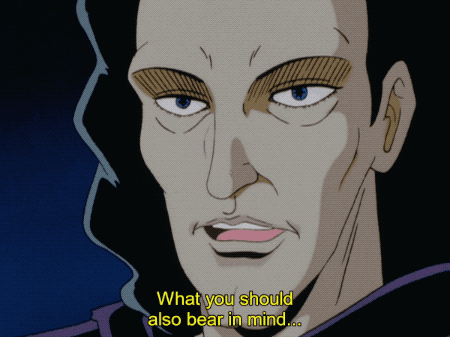
#Legend of Galactic Heroes#Legend of the Galactic Heroes#author:Rebecca#Alliance#Yang#Cazellnu#Hortence#Charlotte#Demon Child#seriously what is her name#Gensui#Julian#gender#heteronormativity#marriage#translation#dammit Sue#dammit Cazellnu
19 notes
·
View notes
Text
0 notes
Text
0 notes
Text
0 notes
Text
0 notes
Text
The Similars-booksvenue.com

BUY NOW Author:REBECCA HANOVER A New York Times Bestseller! Don't miss the series debut that readers are calling Gossip Girl meets The Umbrella Academy and one of the best boarding school books. At Darkwood Academy, secret societies rule and nothing is as it seems… This fall, six new students are joining the junior class at the elite Darkwood Academy. But they aren't your regular over-achieving teens. They're DNA duplicates, and these similars are joining the class alongside their originals. To Know more please visit our website www.booksvenue.com best online book shopping website in uae
#Booksvenue#books#bookselling#Bookshop#Onlinebookstore#UAE#Dubai#uae#bookstore#onlineshopping#booksvenue#dubai#onlinebooks#best websites for books in uae#books online#bookshop
0 notes